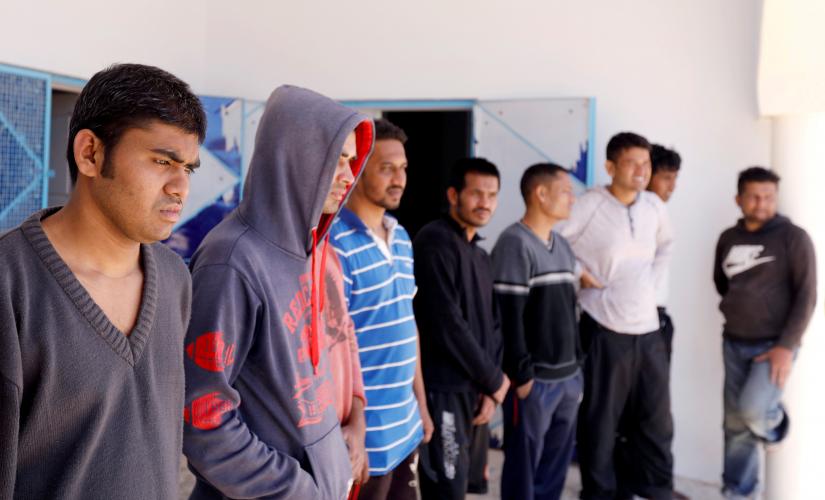 The latest boat tragedy on the Mediterranean has seen 39 Bangladeshis perish at sea. These unfortunate men took a risk to catch a dream but ended up attracting death.
The latest boat tragedy on the Mediterranean has seen 39 Bangladeshis perish at sea. These unfortunate men took a risk to catch a dream but ended up attracting death.
Accidents of boats carrying illegal migrants are nothing new; every year, the news of few such tragedies give us a jolt and make us ask: is it really worth it?
One of the persons who survived the accident is one Belal from Sylhet, who has given a harrowing account of the route and experience which is degrading in all sense of the word.
The question is, when the country is stable with a laudable economic growth, why risk everything to undergo unimaginable risks to go to a foreign country?
By the way, none of the persons taking the hazardous route involving night time treks through jungles, cramped living in small shacks without proper food and journey over water in rickety crafts, is from a poor family.
As studies show, any person who has gone to Europe or is planning to go, must have at least Tk 1 to 1.2 million.
Antar Ali, another returnee, recounts his harrowing experience of entering Europe: “I first went to Baghdad in Iraq from where was taken to Kirkuk and Kurdistan. After working a few days as a labourer, I was sent to Turkey on foot. We walked at night through mountains and rough terrain; then we passed through a jungle for seven hours. Sometimes, we got two loaves of bread; to cross over to Greece, I had to pay Tk 1 Lakh 20 Thousand [120,000].”
Ali could not stay in Greece for more than six months due to a clampdown on illegal workers. Caught by the police, he was in jail and finally came back to Bangladesh.
UNHCR says that in the last seven years, as many as 6,906 persons lost their lives while crossing the Mediterranean while more than 12,000 went missing. As per Eurostat, from 2008 till 2017, more than 100,000 Bangladeshis entered Europe illegally. Of them, 17,215 applied for political asylum of which 11,715 were denied.
Of the seven routes used to enter Europe illegally, the most popular is the Mediterranean route. Each person has to spend around Tk 1-1.4 million to go to Europe.
What is there in Europe that people have to take such risks to get there? Perhaps a look at the ‘overseas obsession’ will clarify.
Milk, honey and gold in other countries
For too long, people in Bangladesh have, erroneously, linked life in foreign country with opulence, abundance and comfort.
This belief goes back to the early 70s when Bangladesh, a war-ravaged state, was desperate to find overseas markets for employment. At that time, flush with petro dollar, Arabian countries opened up the job market to Bangladeshis for two reasons, first, they needed people to work in positions which locals were not willing to do and secondly, as a newly-emerged Muslim nation, oil-rich Middle Eastern countries wanted to help Bangladesh tackle massive unemployment.
People who went abroad at that time were paid handsomely and they came back to regale the successive generations tales of hard work and regular income.
Those who made money abroad came back constructed homes, began businesses here and became prosperous. Their stories of catching the foreign dream became part of urban and rural lore.
Surprisingly, no one actually talks about the thousands who came back without much money and then disappeared into obscurity.
In the embellished talk about earning in dollars, the long working hours plus other travails are/were ignored.
Everyone is obsessed with the one man who made it out of fifty others who did not.
The main problem is that the sentiment of the 70s that money floats in other states is still being perpetuated by handful of success stories.
Consequently, that man who has a business/house in Italy and took his wife and children become the staple talking/inspiration point, whereas the hundreds who either had to come back or are leading tough lives, selling post cards on the streets and living in a small room with ten others, is forcefully sidelined.
It can’t happen to me, most young people contend.  Gamble all for the illusion of overseas life
Gamble all for the illusion of overseas life
What puzzles many is the amount of money spent by those trying to enter Europe illegally. With Tk 1-1.4 million, any person can set up a proper trade in the country and make a comfortable livelihood.
But instead of trying to do something in the country, they will gamble the money and, in most cases, lose it along with their lives.
This tendency is possibly linked to the ‘get rich quick’ fascination developed then nurtured from focusing on successful overseas returnees only.
When a young man is regularly fed tales of people striking it big in some dreamy European destination, he is tempted to try his own luck.
Little does he realise that even if he manages to land in a country, there is no security and guarantee of employment.
Those who manage to get in and find work don’t come back and are compelled to accept the harsh reality because they find consolation in the fact that at least they are earning and can send back some money to pay off loans which had been taken to finance the passage overseas.
Regrettably, many young people are averse to starting something small in the country and then making it bigger through gradual hard work plus tenacity.
When the overseas bug bites, sensible thoughts take a flight. This has happened in the past and continues to happen to millions of young people who, driven by their youthful sense of invincibility, feel that if they land in Europe they will be able to find a way to get work.
In a state of trance, these people lose all link to reality, hardly anyone does any homework on the actual economic situation of the country where he wants to go to and, all advice about staying in the country to do something is met with disdain and absolute rejection.
Deshe Thaika Ki Kormu (what will I do in the country!) is the common reaction though in the end, most of these hapless souls are desperate to come back.
The other common line which fuels the foreign obsession is the belief: “Once I am there, something will happen” The Bengali line for that heard often: Ekta Kichu Hoye Jabe!
The reality must be told and illusions shattered
Those who were on the boat which capsized were running after an illusion. As Belal eventually comes back rattled and dazed, there are countless other young people who are weaving fantasies. This unreal notion needs to be brought down unceremoniously.
The government has a role to play by carrying out campaigns to warn people of the consequences of illegal migration. At the same time, the real condition in European countries must be put forward.
Many of these nations are grappling with woeful economic performance where locals are clamouring for jobs while others are seeing a rise of virulent anti-immigration sentiment.
Add to that rising Islamophobia!
Shockingly, the ‘overseas bug’ is so potent that even one failure is not enough to deter someone. There are instances when someone tried once, twice and thrice and in the end, incurring huge debts, took up work in the country to pay back loans and survive.
Chances are that given a fourth opportunity they will blindly take it and leap into uncertainty.
The fallacy which indoctrinates us into believing that rose, milk and honey can be attained elsewhere is the main culprit.
Reminds one of Amajad Hossain’s “Jabbar Ali” Eid drama of the 70s where a character is so infatuated with going to Dubai that he can only utter one sentence: Taka Den, Dubai Jamu, Dubai Jamu, Taka Den.
Make it big in Bangladesh, instead of living like a destitute elsewhere, should become a major campaign.
Money does not fly in any country, no matter how prosperous. Also, with far less risk, one can easily make a livelihood staying in Bangladesh – let’s get that into our heads.
Towheed Feroze is a news editor at Bangla Tribune and teaches at the University of Dhaka.
 Opinion
Opinion
41319 hour(s) 8 minute(s) ago ;
Morning 10:02 ; Friday ; Jul 04, 2025
To catch a European dream or a grisly death?
Send
Towheed Feroze
Published : 16:46, May 16, 2019 | Updated : 16:57, May 16, 2019
Published : 16:46, May 16, 2019 | Updated : 16:57, May 16, 2019
0 ...0 ...
/hb/
Topics: Towheed Feroze
***The opinions, beliefs and viewpoints expressed in this article are those of the author and do not reflect the opinions and views of Bangla Tribune.
- KOICA donates medical supplies to BSMMU
- 5 more flights to take back British nationals to London
- Covid19: Rajarbagh, Mohammadpur worst affected
- Momen joins UN solidarity song over COVID-19 combat
- Covid-19: OIC to hold special meeting
- WFP begins food distribution in Cox’s Bazar
- WFP begins food distribution in Cox’s Bazar
- 290 return home to Australia
- Third charter flight for US citizens to return home
- Dhaka proposes to postpone D8 Summit
Unauthorized use of news, image, information, etc published by Bangla Tribune is punishable by copyright law. Appropriate legal steps will be taken by the management against any person or body that infringes those laws.
Bangla Tribune is one of the most revered online newspapers in Bangladesh, due to its reputation of neutral coverage and incisive analysis.
F R Tower, 8/C Panthapath, Shukrabad, Dhaka-1207 | Phone: 58151324; 58151326, Fax: 58151329 | Mob: 01730794527, 01730794528


